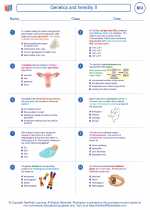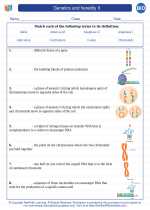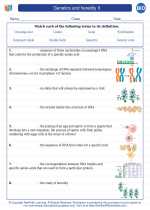Biological Implications
Biological implications refer to the effects or consequences of biological processes, structures, and functions on living organisms and their environment. These implications can range from the molecular level to the ecosystem level and can have significant impacts on the health, behavior, and survival of organisms.
Key Concepts
- Genetic Implications: Understanding the genetic implications involves examining how genetic variations and mutations can lead to inherited diseases, traits, and evolutionary changes within populations.
- Physiological Implications: Exploring the physiological implications focuses on how the structure and function of organ systems, such as the circulatory, respiratory, and nervous systems, impact an organism's ability to survive and thrive in its environment.
- Ecological Implications: Examining the ecological implications involves studying the interactions between organisms and their environment, including the roles of producers, consumers, and decomposers in nutrient cycling and energy flow within ecosystems.
- Ethical Implications: Considering the ethical implications raises questions about the responsible use of biotechnological advancements, such as genetic engineering and cloning, and the impact of human activities on biodiversity and ecological balance.
Study Guide
When studying biological implications, it's essential to focus on the following key areas:
- Understanding Genetic Variation: Learn about the mechanisms of genetic variation, including mutations, genetic recombination, and their roles in evolution and disease.
- Exploring Organ System Interactions: Investigate how different organ systems work together to maintain homeostasis and support the overall function of an organism.
- Analyzing Ecosystem Dynamics: Examine the flow of energy and matter within ecosystems, as well as the interconnectedness of organisms and their environment.
- Evaluating Ethical Considerations: Consider the ethical dilemmas surrounding biotechnological advancements and the conservation of biodiversity.
By mastering these concepts and areas of study, you can gain a comprehensive understanding of the biological implications and their significance in the field of biology.
.◂Biology Worksheets and Study Guides High School. Genetics and heredity II
Worksheet/Answer key Genetics and heredity II
Genetics and heredity II  Worksheet/Answer key
Worksheet/Answer key Genetics and heredity II
Genetics and heredity II  Worksheet/Answer key
Worksheet/Answer key Genetics and heredity II
Genetics and heredity II  Vocabulary/Answer key
Vocabulary/Answer key Genetics and heredity II
Genetics and heredity II  Vocabulary/Answer key
Vocabulary/Answer key Genetics and heredity II
Genetics and heredity II  Vocabulary/Answer key
Vocabulary/Answer key Genetics and heredity II
Genetics and heredity II  Vocabulary/Answer key
Vocabulary/Answer key Genetics and heredity II
Genetics and heredity II  Vocabulary/Answer key
Vocabulary/Answer key Genetics and heredity II
Genetics and heredity II  Vocabulary/Answer key
Vocabulary/Answer key Genetics and heredity II
Genetics and heredity II  Vocabulary/Answer key
Vocabulary/Answer key Genetics and heredity II
Genetics and heredity II 

 Worksheet/Answer key
Worksheet/Answer key
 Worksheet/Answer key
Worksheet/Answer key
 Vocabulary/Answer key
Vocabulary/Answer key
 Vocabulary/Answer key
Vocabulary/Answer key
 Vocabulary/Answer key
Vocabulary/Answer key
 Vocabulary/Answer key
Vocabulary/Answer key
 Vocabulary/Answer key
Vocabulary/Answer key
 Vocabulary/Answer key
Vocabulary/Answer key
 Vocabulary/Answer key
Vocabulary/Answer key

The resources above cover the following skills:
LIFE SCIENCE (NGSS)
Heredity: Inheritance and Variation of Traits
Students who demonstrate understanding can:
Ask questions to clarify relationships about the role of DNA and chromosomes in coding the instructions for characteristic traits passed from parents to offspring.